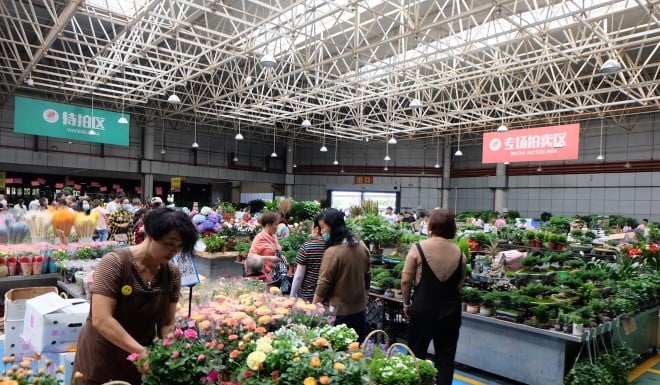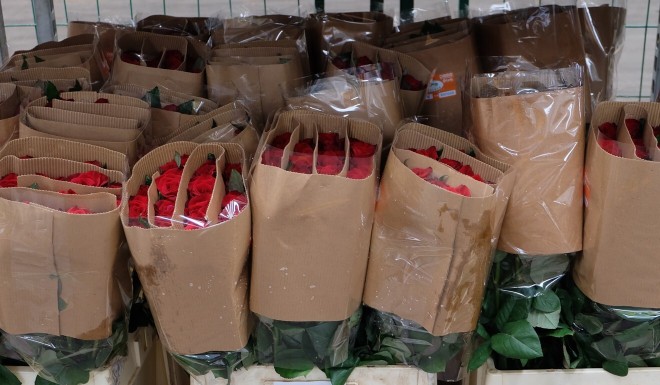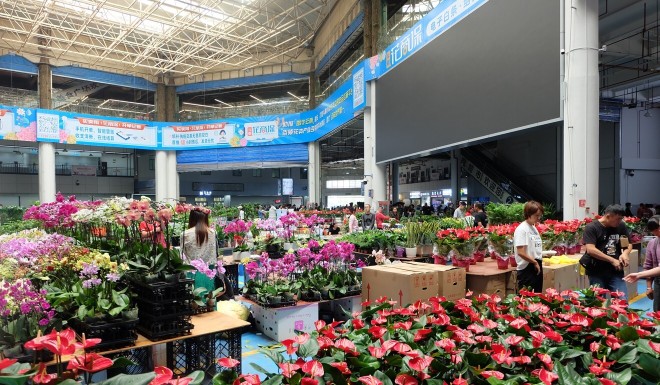
Hope blooms for China’s flower trade as rose prices soar to meet demand
- Lovers return to market for Chinese Valentine’s Day in best trading since February’s romantic washout caused by Covid-19
- Fears remain that the pandemic’s economic hit to the middle class will hamper a full recovery
Everything is coming up roses for the flower sellers of China’s southwestern province of Yunnan, where prices of the blooms have jumped more than 200 per cent in the past week – from 1 yuan (14 US cents) to 2.5 yuan each, and rising.
“That could be good news. It means more people may be willing to buy flowers,” said Zhao, from Wenshan county in Yunnan.

The Qixi Festival promises to be the strongest season of the year so far for China’s flower industry which, like many others around the world, has been almost crushed by the pandemic since late January.
“Most of us stayed at home during Valentine’s Day, and even when the market reopened, I still felt hesitant if a client walked too close to me, although we didn’t have infections in the market and the logistics were cut off so we could not really send out flowers,” Cao said.
While visitor numbers to Dounan market remain lower than they used to be, Cao said she was glad things were gradually getting back to normal.
Tourism to the province – which borders Vietnam, Laos and Myanmar and is known for its ethnic minority cultures and magnificent natural beauty – resumed in March and China last month announced that cross-provincial tourism could restart as the government struggled to expand consumption and revive market confidence while preventing a new wave of infections.
China’s tech industry workers face something new amid Covid-19: job uncertainty
Cao, who is originally from Hubei province in central China where the outbreak began, said her business had recovered by 60 per cent, thanks to the internet and the country’s booming logistics industry.
At Dounan, Cao and her three employees were busy wrapping heart-shaped flower baskets, while her husband and daughter were selling flowers on social networking services WeChat and Douyin. “Business for Qixi Festival this year appears to be similar to previous ones,” she said.
Ian Wang, a 28-year-old white-collar worker in Kunming, said he would consider buying roses for his wife on Tuesday, despite the high prices. “Because my wife loves roses, it’s not about the price,” he said.

Dounan, about 18km from downtown Kunming, has long been home to thousands of flower farms, thanks to its perpetual springlike weather which provides the ideal climate for plants and flowers.
In 2010, with a 3.88 billion yuan (US$549 million) investment from some Hong Kong companies, Dounan was upgraded to a national flower hub, with a mega flower market covering an area of 810,000 square metres which supplies more than three-quarters of the country’s cut blooms and exports throughout the region.
Every day, more than 600 buyers sit in the market’s smoke-filled auction room bidding for a share of the 10 million blooms up for sale, with demand driven by the country’s growing middle class. Last year, more than 9.2 billion flowers were traded at Dounan market with a turnover of nearly 7.5 billion yuan.

By 2028, Dounan is expected to replace the Netherlands’ Aalsmeer as the world’s largest flower market, with trade increasing to 16 billion flowers and annual turnover expected to reach 35 billion yuan, according to official news portal Yunnan.cn.
But not everyone is optimistic. Flower farmer Zhang Runhong, who owns more than 13,340 square metres of fields in Chuxiong Yi autonomous prefecture – about 120km west of Kunming – lost nearly 300,000 yuan when he made the tough decision to destroy all his lisianthus, sunflowers, lilies and baby’s breath flowers as most of China’s economy shut down.
While there were signs of economic recovery, Zhang, in his 40s, said his biggest concern was how the pandemic – largely under control in China – would whittle away at the country’s booming middle class. Big wedding banquets were not allowed and mass gatherings were banned. “These events are big sources of demand,” Zhang said.
“If people’s incomes are shrinking, their purchasing power would be decreasing, and because cut flowers are not a must-have if you don’t have enough money, you won’t even think of buying flowers,” he said. “That’s why some florists have decided to grow vegetables instead.”
‘Revenge spending’ unlikely to be the answer for China’s virus-hit economy
The flower industry could be one of the worst hit by the pandemic. Turnover at the Dounan market slumped by 70 per cent in February compared with the same period of last year, and more than one million flowers were crushed on February 10 alone because of the nationwide lockdown, at an estimated loss of 4 billion yuan in the first quarter, according to Beijing Daily.
In the Netherlands, about 400 million flowers, including 140 million tulip stems, were reportedly destroyed between March and April at Aalsmeer, when the European country tightened measures to contain the coronavirus spread.

01:58
Millions of flowers destroyed amid coronavirus outbreak in the Netherlands
Flower exports from China have also stalled, according to Fei Xuemei, the president of Yunnan Aliveflora which has supplied Europe and Southeast Asian countries such as Singapore, Thailand and Malaysia.
China has significantly cut international flights in and out of the country since March, because of the pandemic situation overseas, and although flights have slowly resumed, Fei said logistics would be affected without the steady flow of travel.
“For the domestic market, we are looking to grow flowers of higher quality, because these are what people need, but for overseas markets, I don’t have a solution yet,” Fei said.

